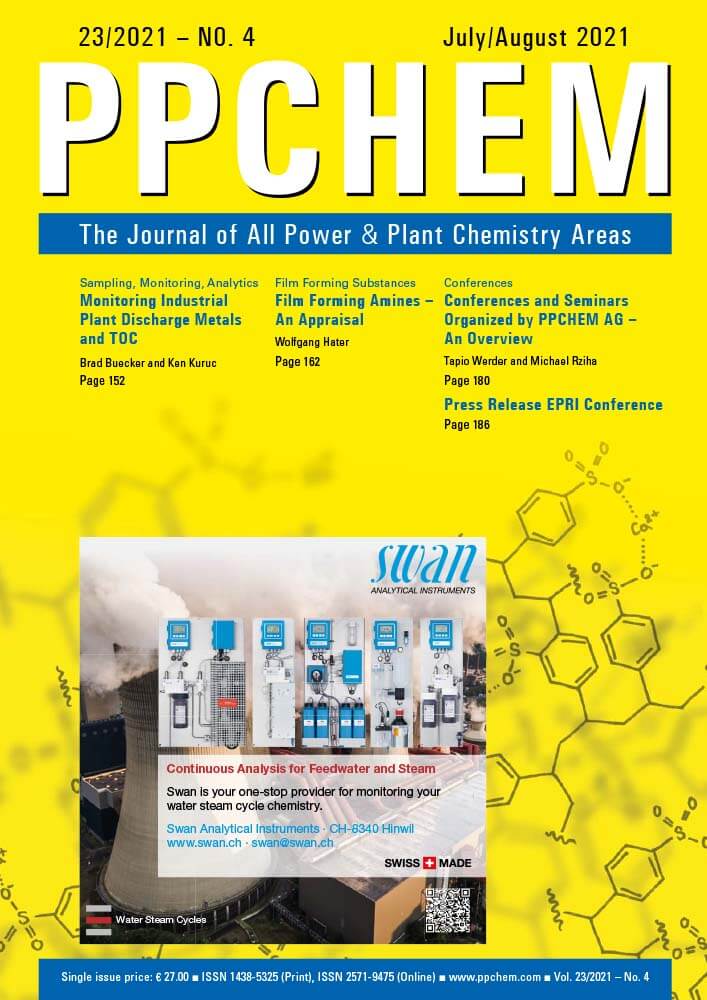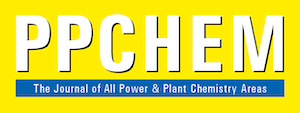
For members only
ABSTRACTS
Monitoring Industrial Plant Discharge Metals and TOC
Brad Buecker and Ken Kuruc
Industrial facilities such as refineries, petrochemical plants, steel mills, metal finishing facilities, pulp and paper mills, pharmaceutical plants, etc. require substantial wastewater treatment, as some processes at these facilities can release many complex carbon compounds or other toxic constituents, including metals, to waste streams.
While various techniques are available for measuring trace level metals in process water, to date they have been rather unavailable to many industrial locations because of capital cost requirements or the need for specially trained technicians. Two well-known techniques are inductively-coupled plasma and atomic absorption spectroscopy, which need specially trained operators and require complex sample preparation and expensive instrumentation.
This article discusses another existing technology, colorimetry, which has been modified for on-line monitoring. The method is suitable for many facilities and can be operated by a wide range of plant personnel. In many cases, the readings can be enhanced with TOC analyses to provide additional protection for industrial water/steam systems.
PPCHEM® 2021, 23(4), 152–157
For Members only
Film Forming Amines – An Appraisal
Wolfgang Hater
The technology of film forming amines or more generally film forming substances in water treatment has been well known for decades. The acceptance of their application in watersteam cycles was significantly increased by two IAPWS Technical Guidance Documents issued in 2016 and 2019. These documents provide a brief synopsis of the scientific knowhow, and, more importantly, give practical guidance to people interested in this technology. This paper reviews and summarizes the scientific progress since then and identifies further research needs. Film forming substances have an important potential for the reduction of plant emissions, which, in addition to the demand for molecules with improved environmental properties, is looked upon as a driving force for future development.
PPCHEM® 2021, 23(4), 162–175
For Members only
Conferences and Seminars Organized by PPCHEM AG – An Overview
Tapio Werder and Michael Rziha
Since 2012, PPCHEM AG and its precursor organization, Waesseri GmbH, have organized more than 30 conferences and seminars around the world with the mission of expanding the knowledge of cycle chemistry and the understanding of analytical instruments. Over the past 9 years, different formats of events have been developed to fit the different needs and interests within the power plant chemistry community.
The first kind of event series developed was called Power Cycle Instrumentation Seminars (PCIS), with the mission of expanding the knowledge of cycle chemistry and the understanding of sampling techniques and analytical instruments. Based on the feedback from the PCIS participants a new series of events – PowerPlant Chemistry Forums (PPCF) – was introduced in 2016. Compared to the PCIS the PPCF does not concentrate exclusively on sampling and instrumentation, but instead includes a wide variety of nearly all aspects of power plant chemistry, such as life-cycle chemistry optimization, start-up chemistry and early operation experience, and plant failures and subsequent chemistry adjustments. The forum is basically a typical conference, where numerous international speakers from many different organizations present, hence it is a platform for all participants to exchange information and knowledge and for networking.
Beside the PCIS and the PPCF, educational seminars have also been developed and offered. These seminars are typically focused on a “hot topic” from power plant chemistry and usually they are conducted by PPCHEM’s chief key expert power plant chemistry Michael Rziha.
This contribution outlines the developments in the past years and gives more details on the different formats of events which are currently organized by PPCHEM AG.
PPCHEM® 2021, 23(4), 180–185
For Members only
PRESS RELEASE: EPRI 13th International Conference on Cycle Chemistry in Fossil and Combined Cycle HRSG Plants (ICCC13): Details Advances in R&D
EPRI’s 13th International Conference on Cycle Chemistry in Fossil and Combined Cycle HRSG Plants was conducted virtually June 22–24, 2021.
The conference was attended by 146 different professionals representing 10 countries, including Australia, Canada, Malaysia, Philippines, Taiwan, South Africa, Switzerland, United Kingdom, United Arab Emirates, and the United States.
The EPRI Boiler and Turbine Steam and Cycle Chemistry R&D program (Program 226) conducts collaborative research led by Program Manager Brad Burns. The collaborative program is a global leader in comprehensive research in power plant steam and water cycle treatment to minimize corrosion and deposition.
The conference is hosted by EPRI every three years. This latest event featured 21 presentations by international experts, equipment manufacturers, chemical suppliers, and power plant chemistry users. Discussions on a wide range of cycle chemistry-related topics added participation value to plant users, equipment and chemical suppliers, and researchers.
PPCHEM® 2021, 23(4), 186–187

